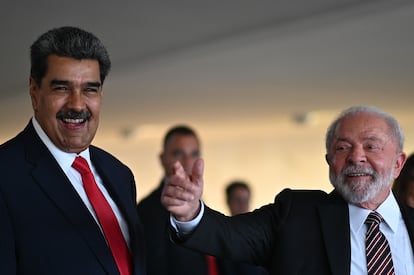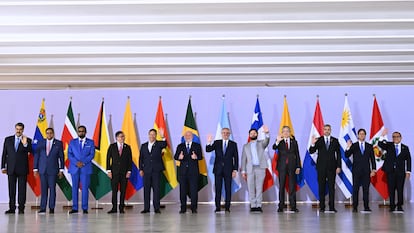Summit of South American leaders faces divisions on Venezuela: ‘The human rights situation is not a narrative construction’
The meeting has given Nicolás Maduro a diplomatic boost, but Chile and Uruguay were quick to distance themselves from Lula’s comments about the crisis in the country


The diplomatic rehabilitation of Venezuelan President Nicolás Maduro in the region culminated Tuesday at a meeting of South America’s leaders in Brasília in Brazil, where the Chavista leader was greeted as an equal by his counterparts. The purpose of the meeting, which was organized by Brazilian President Luiz Inácio Lula da Silva, was not officially to end Maduro’s isolation, but rather to promote South American integration, which has been torn apart in recent years by ideological differences.
The summit in Brazil was Maduro’s first face-to-face meeting with other South American leaders in nine years. While Maduro’s return to the regional diplomatic stage was celebrated, the situation in Venezuela did not go unaddressed. Both Chile’s leftist President Gabriel Boric and Uruguay’s right-wing leader Luis Lacalle Pou called out Maduro — in respectful terms — over the crisis facing Venezuela.
“We are glad that Venezuela is returning to multilateral bodies [...] This, however, cannot mean sweeping under the rug principles that are important to us,” said Boric at the end of the meeting. The Chilean president also respectfully distanced himself from Lula’s controversial comments that the image of an “anti-democratic” Venezuela was a “narrative” promoted by Western countries. “The human rights situation is not a narrative construction, it is a serious reality,” said Boric.
Uruguay’s Luis Lacalle Pou also said he was surprised that Lula called the crisis in Venezuela a “narrative.” Lacalle Pou — who, like other South American leaders, recently reopened his country’s embassy in Caracas — pointed out the principles included in the final declaration. “When we sign, we [all present] do not have the same definition, which I believe is one, that of the Royal Spanish Academy, of what respect for institutions, human rights and democracy are,” he said while the document was being negotiated. The text was approved by acclamation. And both Boric and Lacalle Pou thanked Lula for organizing the summit.
At the end of the event, Maduro told the press that the meeting marked the “beginning of a new stage.” “We have no problem sitting down to talk with any political force or president in a respectful, tolerant dialogue of unity in diversity, that is what we had here,” he added. With Juan Guaidó's stage as interim president over, many countries, neighbors included, have re-established relations with Chavista Venezuela in the past year.
The meeting in Brasília was attended by presidents Alberto Fernández (Argentina), Luis Arce (Bolivia), Gabriel Boric (Chile), Gustavo Petro (Colombia), Guillermo Lasso (Ecuador), Irfaan Ali (Guyana), Mario Abdo Benítez (Paraguay), Cha Santokhi (Suriname), Luis Lacalle Pou (Uruguay), Nicolás Maduro (Venezuela) and Peruvian Prime Minister Luis Alberto Otárola. Not a single female leader was in attendance. Peruvian President Dina Boluarte was absent, as expected, as she faces charges and cannot leave the country, nor does she have a vice president to stand in.
In the so-called “family photo,” Maduro is seen standing on the far left, next to the leaders of Suriname and Guyana, while Lula, Fernández, Arce, Petro and Boric are in the center. To foster trust and open dialogue, each president was also accompanied by their foreign minister and one or two advisors.

Lula, who with half a century of politics behind him is the most senior and experienced of the presidents of the Southern Cone, also gathered his counterparts to get to know them better. Personal contact is his forte. He wants South America’s leaders to put aside their ideological differences, increase cooperation and find a way to act as a bloc in the face of global and local challenges.
“In the region, we let ideologies divide us and stop our efforts for integration. We abandoned the channels of dialogue and the mechanisms of cooperation and, as a result, we all lost out,” he said, at the beginning of the meeting. “Either we get together to fight among ourselves and defend our interests together, or we are puppets in the hands of the big economies,” he added, in a separate speech before the official dinner. During this address, in which he recounted moments from his long political career, he reiterated his commitment to promoting alternative currencies to the dollar in trade relations and perhaps even creating a South American or BRICS (Brazil, Russia, India, China and South Africa) common currency.
Lula also admitted that the years of the leftist boom, when Venezuela’s Hugo Chávez, Argentina’s Néstor Kirchner, Bolivia’s Evo Morales and Ecuador’s Rafael Correa were in power are over, and that now the region is more ideologically pluralistic. “We need to learn to coexist with that plurality because it means exercising democracy to its final consequences.”
The Brazil of former far-right leader Jair Bolsonaro, who turned the country into an international pariah, is a thing of the past. Lula has made no secret of the fact that he would like to revive the regional body Unasur, but not everyone supports the plan. At the meeting, the leaders agreed to create a commission of foreign ministers to provide a list of options within 120 days.
Unasur was founded in 2018 amid the leftist wave in Latin America. But when the region shifted to the right, more than half its members left the group and founded a conservative equivalent called Prosur in 2018. For South America to have its own version of the African Union or European Union, it would have to move past organizations that turn into clubs for ideologically aligned allies. Lula pointed out that together, South America is the fifth-largest economy in the world. One of the proposals raised at the meeting was to create a student-exchange program similar to the Erasmus program in Europe.
Sign up for our weekly newsletter to get more English-language news coverage from EL PAÍS USA Edition
Tu suscripción se está usando en otro dispositivo
¿Quieres añadir otro usuario a tu suscripción?
Si continúas leyendo en este dispositivo, no se podrá leer en el otro.
FlechaTu suscripción se está usando en otro dispositivo y solo puedes acceder a EL PAÍS desde un dispositivo a la vez.
Si quieres compartir tu cuenta, cambia tu suscripción a la modalidad Premium, así podrás añadir otro usuario. Cada uno accederá con su propia cuenta de email, lo que os permitirá personalizar vuestra experiencia en EL PAÍS.
¿Tienes una suscripción de empresa? Accede aquí para contratar más cuentas.
En el caso de no saber quién está usando tu cuenta, te recomendamos cambiar tu contraseña aquí.
Si decides continuar compartiendo tu cuenta, este mensaje se mostrará en tu dispositivo y en el de la otra persona que está usando tu cuenta de forma indefinida, afectando a tu experiencia de lectura. Puedes consultar aquí los términos y condiciones de la suscripción digital.








































